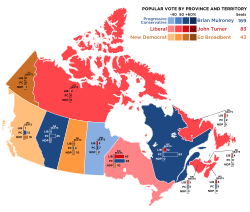Canadian federal election, 1988
|
|
|||||||||||||||||||||||||||||||||||||||||||||||||||||||||||||||||||
|
|||||||||||||||||||||||||||||||||||||||||||||||||||||||||||||||||||
|
|||||||||||||||||||||||||||||||||||||||||||||||||||||||||||||||||||
|
|
|||||||||||||||||||||||||||||||||||||||||||||||||||||||||||||||||||
|
|||||||||||||||||||||||||||||||||||||||||||||||||||||||||||||||||||
Brian Mulroney
Progressive Conservative
Brian Mulroney
Progressive Conservative
The Canadian federal election of 1988 was held November 21, 1988, to elect members of the Canadian House of Commons of the 34th Parliament of Canada. It was an election largely fought on a single issue: the Canada-U.S. Free Trade Agreement (FTA).
Incumbent Prime Minister Brian Mulroney, leader of the Progressive Conservative Party, had signed the agreement. The Liberal Party, led by John Turner, was opposed to the agreement, as was the New Democratic Party led by Ed Broadbent.
The Conservatives went into the election suffering from a number of scandals. Despite winning a large majority only four years before, they looked vulnerable at the outset.
The Liberals had some early struggles, notably during one day in Montreal where three different costs were given for the proposed Liberal daycare program. The campaign was also hampered by a Canadian Broadcasting Corporation report that stated there was a movement in the backroom to replace Turner with Jean Chrétien, even though Turner had passed a leadership review in 1986.
...
Wikipedia




